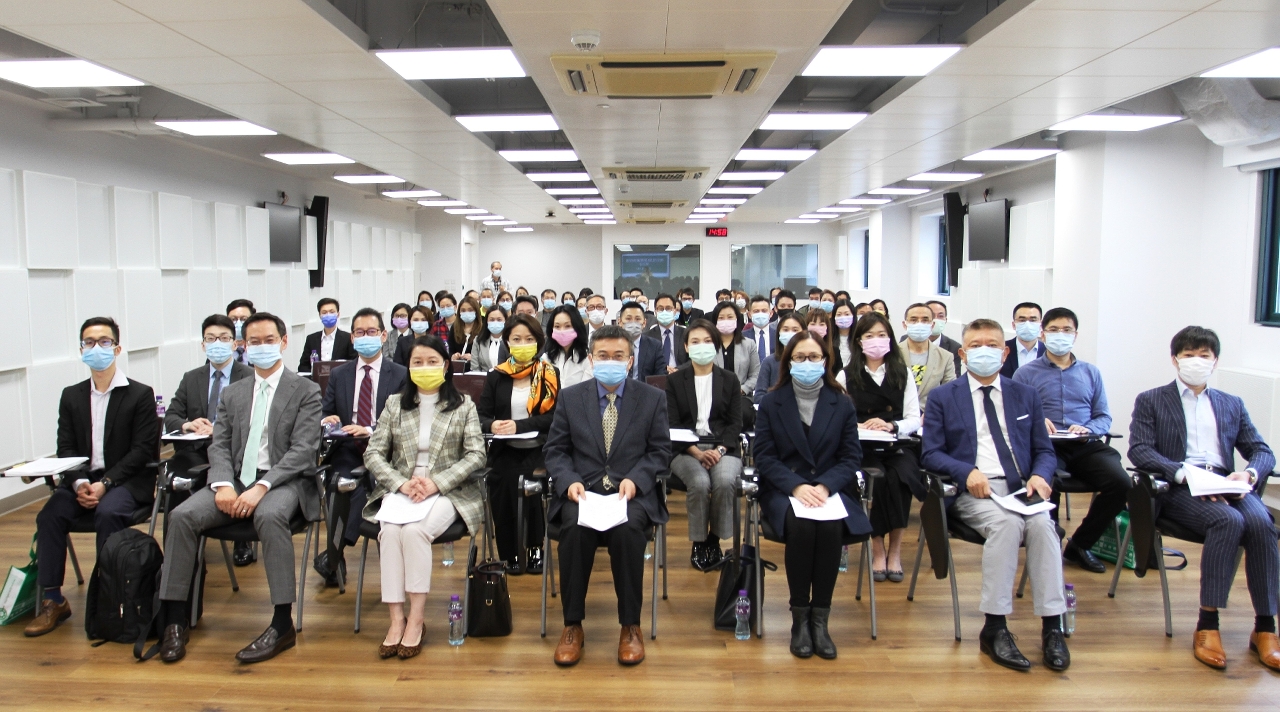 Guests and participants at the seminar of “Innovative Thinking on the Development of Gaming and Tourism”
Guests and participants at the seminar of “Innovative Thinking on the Development of Gaming and Tourism”
The Centre for Gaming and Tourism Studies (CJT) of Macao Polytechnic Institute (MPI) held a seminar “Innovative Thinking on the Development of Gaming and Tourism” on March 10, 2021. The seminar featured presentations by distinguished speakers, including Mr. Jay Chun, Chairman of Paradise Entertainment Ltd., Mr. Tian Han, SVP of Gaming Operations & Strategic Marketing at MGM, as well as Prof. Zeng Zhonglu and his associates of MPI. The innovation issues in gaming technology were discussed in the seminar, alongside the new theoretical paradigms in gaming and tourism research.
Prof. Wang Changbin, Director of the Centre for Gaming and Tourism Studies, remarked in the opening speech that gaming innovation includes the innovation of casino games and gaming facilities, as well the continuous renovation or transformation of casino premises. In the past two decades, new casinos have continuously opened in Macao, frequently attracting customers to the city. However, due to the limited land resources in Macao, gaming and tourism enterprises should pay more attention to the innovation of casino games and gaming facilities; meanwhile, relevant government departments should speed up the approval process of new casino games and gaming facilities to meet the ever-increasing intense competition in the international gaming market.
In his speech “Innovation Drives Development, Reform Creates the Future”, Mr. Jay Chun used the live multi-game products as an example to analyze the impact of innovation on the Macao gaming market. He considered that encouraging the production and export of the gaming equipment manufacturing and other similar non-gaming electronic games, together with the enhanced training of relevant technology talent, can transform Macao into a high-tech economic structure and promote the city’s strategic goal of economic diversification. Mr. Tian Han gave a detailed description of the innovation process of introducing RFID-enabled gaming tables to MGM in his speech “The Road to Casino Innovation”. He stressed that innovation does not happen overnight. This process requires huge resources in all aspects and assumes various risks. However, the results of innovation can eventually lead to changes in business models, thereby producing economic benefits and competitiveness. Mr. Wang Xing, a PhD student at MPI, believed that there is a trend of integrating gaming with video games, social network games, mobile games, and interactive TV games. The gaming industry needs to study the challenges of new types of games, and the regulatory authorities should take effective measures to regulate such gamification.
The CJT’s latest research on the new paradigm of gaming and tourism conducted by Prof. Zeng Zhonglu, Associate Prof. Ji Chunli, and Dr. Emily Man Ian were also presented at the seminar. Specifically, Prof. Zeng Zhonglu suggested that design thinking should be introduced into the gaming and tourism development strategy in Macao. He pointed out that design thinking refers to an innovative process based on designers’ sensitivity and empathy to integrate technology, market, and sentiment. The thinking mode and research methods under design thinking have exhibited new ways of thinking and operations for the development of gaming and tourism, and the Macao gaming and tourism industry can find such practices useful, too. Associate Prof. Ji Chunli introduced the latest development of flow experience theory. He proposed that the industry and academia could use this theory to study the issue of gambling addiction. Dr. Emily Man Ian remarked that the causes of gambling addiction are very complicated. It is generally believed that there are two major factors: genetic and environmental. Genetic factors such as neurotransmitter system, neuroendocrine system, gene and brain structure abnormalities could be the main biological mechanisms. Academia should address the biological mechanisms of gambling disorders to improve the effects of the intervention on gambling behaviours.
The seminar was attended and well received by more than 70 participants, including representatives from the Economic and Technological Development Bureau, Macao Government Tourism Office, Gaming Inspection and Coordination Bureau, Wynn Resorts (Macau) S.A., Sands China Ltd., MGM, Melco Resorts & Entertainment Ltd., Galaxy Entertainment Group, Sociedade de Jogos de Macau, S.A., and Paradise Entertainment Limited, as well as the teaching and research staff at the Centre for Gaming and Tourism Studies of MPI.



